Aussies fear China more than global terrorism, survey finds
A new poll shows Australians are worried about China’s grip on the world, as France slammed the AUKUS nuclear submarine deal.
National
Don't miss out on the headlines from National. Followed categories will be added to My News.
China’s influence is top of Australian’s concerns for global affairs, new polling shows.
Nearly half (48 per cent) of Australians support partnering with the US on strategic defence matters, even at significant cost in defence spending, according to international polling by advisory firm CT Group.
Around one-third of Australian and British voters expect China to be more influential by 2031, while American voters believe the US will still be the most influential power in 10 years time.
A significant minority of voters in all three countries (38 per cent in the US, 42 per cent in the UK and 43 per cent in Australia) believe US power is in decline.
The research, conducted between August 30 and September 3 after the departure of US troops from Afghanistan, shows Australians are more focused on the rising influence of China than they are about the risk of global terrorism, CT Group managing director Catherine Douglas said.
“Although voters still view the US as the dominant force in the world, Australians in particular do not see this lasting for long as China continues to flex itself in the region on trade and defence posture,” Ms Douglas said.
“On balance Australians support a partnership with the US on a strategic defence capacity, but is incumbent on our leaders to demonstrate how these relationships make us safer and that the resources are commensurate with the risk we face. “
The survey was taken before the AUKUS nuclear submarine deal was announced last week.
Ms Douglas said broadly, Australians still back the US alliance but it is evident that the level of conviction has begun to waver.
“For example, Australians are divided on whether the US is the world’s most potent global military, and Australians took a dim view of how the Biden administration handled the withdrawal from Afghanistan, even though the decision to pull US troops out of the country had strong support. So the renewed focus on how the US relationship can contribute to the security of Australia and the Pacific region comes at a critical time,” she said.
“Geography and trade relations naturally make the rise of China’s influence of greater concern to Australians than to British or American voters. Australians see trade tensions receding in importance over the coming decade but there is a perception of increased risk of an actual conflict.”
‘MAYBE WE’RE NOT FRIENDS’: FRANCE SLAMS SCOMO
The former French Ambassador to Australia has ripped into Scott Morrison for his defence of the AUKUS submarine deal, claiming the Prime Minister lied about warning France about it.
Jean-Pierre Thebault, who had been the French Ambassador in Canberra since 2020, was recalled last week after France expressed outrage at being left out of the new nuclear submarine deal between the US, UK, and Australia.
Speaking to Radio National on Monday, Mr Thebault said France had been completely blindsided by Mr Morrison’s decision to accept the new deal.
“We discover(ed) through the press that the most important person in the Australian government kept us in the dark intentionally until the last minute and was not willing to at least have the decency to enter conversation about the alternative,” Mr Thebault said.
“This is not an Australian attitude towards friends.”
“Maybe we’re not friends.”
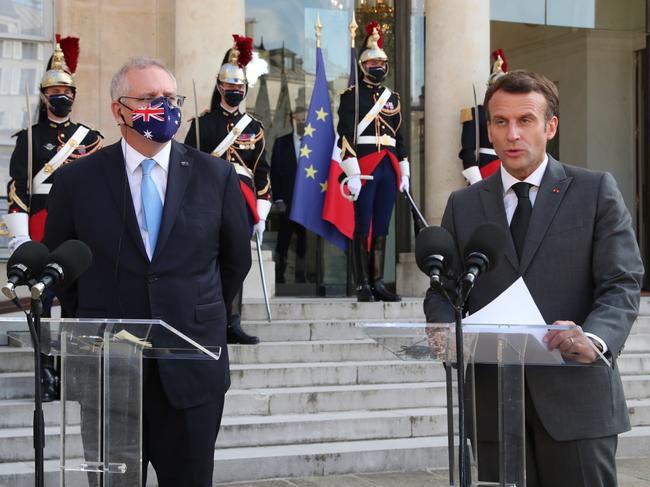
Mr Morrison had previously rejected that he had not warned France about the new deal, insisting he told French President Emmanuel Macron in June that Australia might scrap its original submarine agreement.
“I made it very clear. We had a lengthy dinner there in Paris about our very significant concerns about the capabilities of conventional submarines to deal with the new strategic environment we're faced with,” the PM told FiveAA Radio last Friday.
“I made it very clear that this was a matter that Australia would need to make a decision on in our national interest.”
But the French Ambassador insisted France had never been warned about the potential for a new deal which would exclude them.
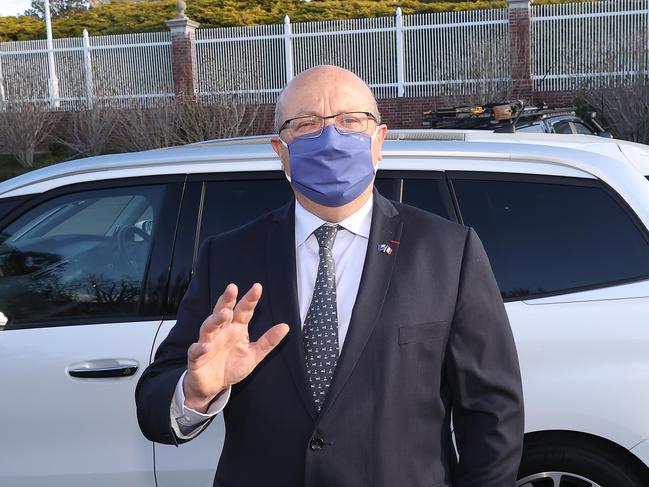
“There have always been discussions about how the program addresses the needs of Australia and it was the exchanges on those subjects that kept us busy until the last minute,” Mr Thebault said.
“But in no way was it said to us that this could lead to an alternative program.
“This should have normally been the case between trusted allies.”
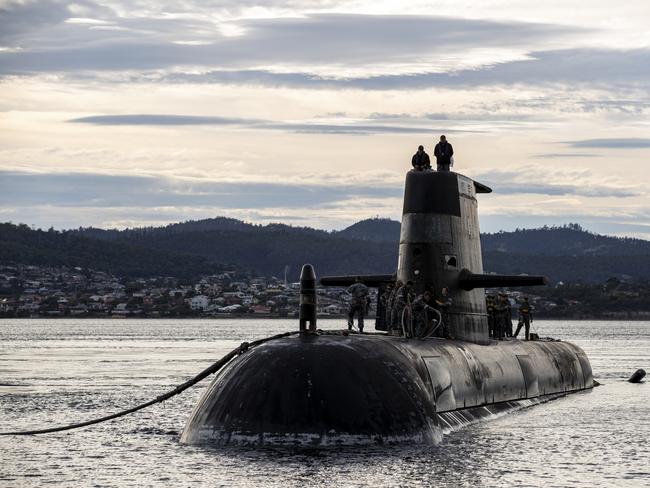
Mr Thebault denied reports that his country intended to lobby the European Union to reject a free-trade agreement with Australia.
“No, we're not lobbying Europe to do this,” he told Radio National.
“At this stage negotiations do continue and indeed there is a strong interest I recognise for Australia to have a free-trade agreement with the EU.
“Australia should have all reasons to be very much willing to strike an agreement with the EU.”
‘WE WANT EXPLANATIONS’: BIDEN-MACRON TO TALK
US President Joe Biden has requested early talks with French President Emmanuel Macron, France officials have said, in an apparent effort to mend bridges after a row over a submarines contract sparked rare tensions between the allies.
The announcement came after Australian Prime Minister Scott Morrison rejected French accusations that Canberra had lied about plans to cancel the contract to buy French submarines, saying he had raised concerns over the deal “some months ago”.
Australia’s decision to tear up the French deal in favour of American nuclear-powered vessels sparked outrage in Paris, with Macron recalling France’s ambassadors to Canberra and Washington in an unprecedented move.
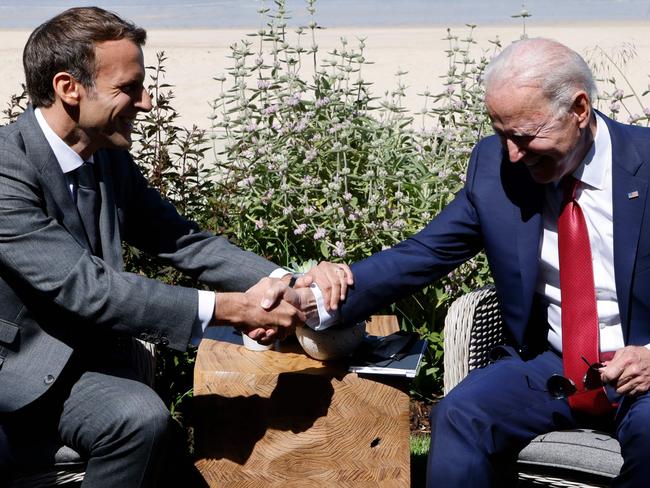
But French government spokesman Gabriel Attal said there would be a telephone conversation between Biden and Macron “in the coming days” at the request of the US president.
Macron will ask the US president for “clarification” after the announcement of a US-Australian-British defence pact that prompted Canberra’s cancellation of the huge contract for diesel-electric French vessels.
“We want explanations,” Attal said. The US had to answer for “what looks a lot like a major breach of trust”.
Mr Morrison meanwhile insisted that he and his ministers had made no secret of their issues with the French vessels.
“I think they would have had every reason to know that we had deep and grave concerns,” he told reporters in Sydney.
“We made very clear that we would be making a decision based on our strategic national interest.”
‘WE WERE HONEST’: DUTTON DEFENDS SUBMARINES DEAL
Defence Minister Peter Dutton has rebuked accusations Australia lied to its French counterparts as the fall out over a decision to tear up a contract for submarines continues.
On Thursday, Australia announced it would sign a new security pact, known as AUKUS, with the UK and US. The deal means Canberra would turn its back on a $90 billion contract with France’s Naval Group in order to acquire eight nuclear submarines.
The agreement has caused furore from the French over claims Australia did not inform Paris of the deal prior to its announcement.
But Mr Dutton insisted the Australian government had been “upfront, open and honest” about their ongoing concerns with the French submarine program.
“We can understand of course, the French are upset at the cancellation of a contract but in the end, our job is to act in our national interest,” Mr Dutton told Sky News on Sunday morning.
“Suggestions that the concerns hadn’t been flagged by the Australian government, just defy, frankly, what’s on the public record and certainly what we’ve said publicly over a long period of time. The government has had those concerns, and we’ve expressed them.
“We’ve been open about our concerns and we’ve been open about the fact we need to act in our national interest … given the changing circumstances in the Indo-Pacific.”

Mr Dutton also confirmed Australia could consider leasing or purchasing existing submarines from the US or UK to bridge the gap until the nation’s homemade submarines are delivered in late 2030.
“Already, I’ve met with a number of my counterparts here from the secretary down in terms of those that are making decisions and we will have further discussions with the Brits as well,” Mr Dutton said.
However, just an hour later on Insiders, Finance Minister Simon Birmingham indicated that may not be the case. Instead, Australia would likely remain reliant on other “joint operations” with other nations.
“Doing that wouldn’t necessarily increase … the number of submarines and the capability across all of the partner nations. But doing so may provide opportunities for us to train our sailors, provide the skills and knowledge in terms of how we operate,” he said.
“I expect that we will see, whether it is lease arrangements or whether it is greater joint operations between our navies in the future that sees our sailors working more closely and indeed, potentially on UK and US vessel tolls get that skills and training and knowledge.”
The Defence Minister’s comments followed an extraordinary decision from the French government to recall their ambassadors to Australia and the US.
In an interview with French television overnight, Foreign Minister Jean-Yves Le Drian hit out at Canberra and Washington for lying and warned of a “serious crisis” between the allies.
“There has been lying, duplicity, a major breach of trust and contempt,” Le Drian told France 2.
“The fact that for the first time in the history of relations between the United States and France we are recalling our ambassador for consultations is a serious political act, which shows the magnitude of the crisis that exists now between our countries.”
FRANCE RECALLS AMBASSADORS OVER DEAL
France has recalled its ambassadors from Australia and the US as it continues to react with fury to the $90 billion submarine contract Canberra axed in favour of a nuclear submarine deal.
French Foreign Minister Jean-Yves Le Drian announced early Saturday the ambassadors were being withdrawn for consultations after Canberra ditched a deal to buy the French submarines in favour of US vessels.
Mr Le Drian said in a statement that the decision was made to immediately recall the two French ambassador due to “the exceptional seriousness of the announcements made on September 15 by Australia and the United States”.
US President Joe Biden announced the new Australia-US-Britain defence alliance on Wednesday, extending US nuclear submarine technology to Australia as well as cyber defence, applied artificial intelligence and undersea capabilities.
The move infuriated France.
The French ambassador recalls from the United States and Australia, key allies of France, are unprecedented.
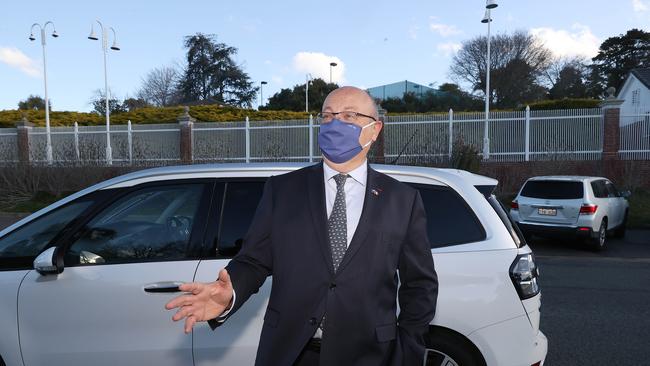
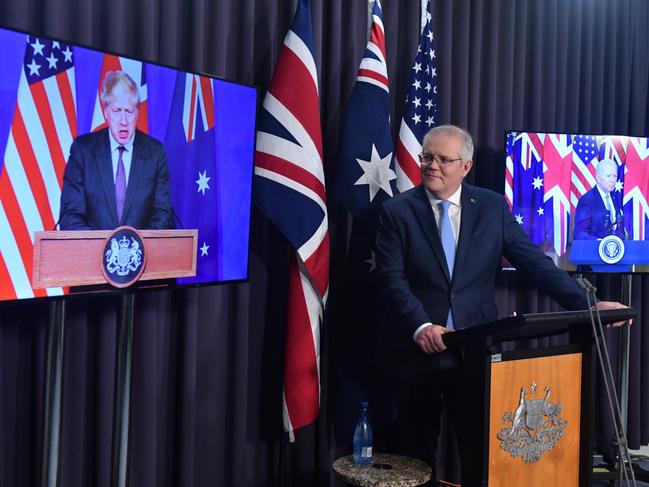
France on Thursday accused Australia of back-stabbing and Washington of Donald Trump-era behaviour over the submarines deal.
“It’s really a stab in the back,” Le Drian said Thursday.
“We had established a relationship of trust with Australia, this trust has been betrayed”.
France has also called off a gala at its ambassador’s house in Washington scheduled for Friday.
The event was supposed to celebrate the anniversary of a decisive naval battle in the American Revolution, in which France played a key role.
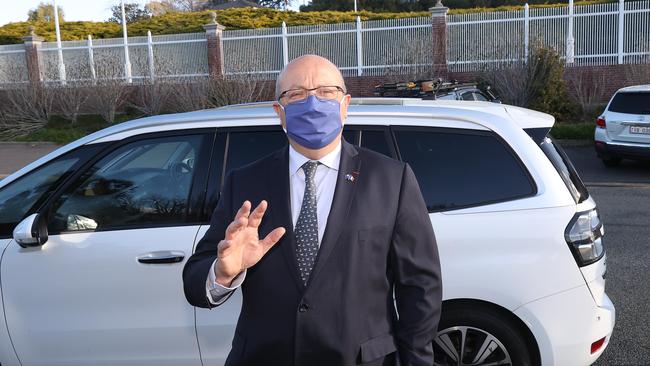
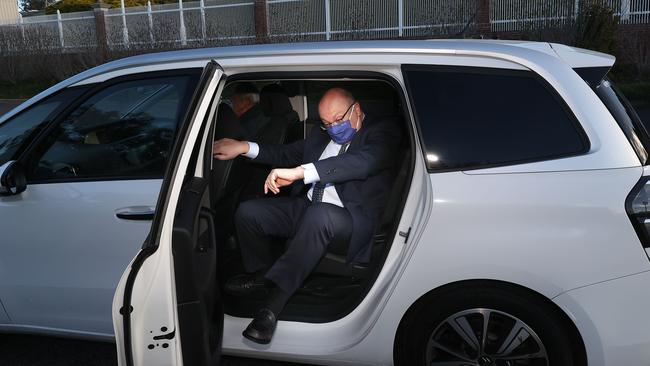
Before the ambassadors were recalled, France’s European Affairs Minister Clement Beaune said Paris was unable to trust Canberra in ongoing European Union trade deal talks.
Australian Foreign Minister Marise Payne, in Washington, said she understood the “disappointment” in Paris and hoped to work with France to ensure it understands “the value we place on the bilateral relationship and the work that we want to continue to do together”.
The White House on Friday expressed “regret” over the recall of France’s ambassador, but said that the United States would work to resolve the diplomatic row.
“We regret that they have taken this step, we will continue to be engaged in the coming days to resolve our differences, as we have done at other points over the course of our long alliance,” a White House official said.
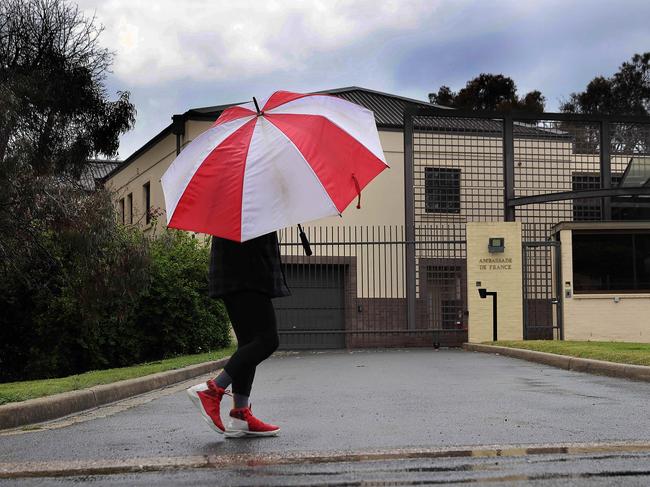
FRENCH DEAL WAS DOOMED
Not a rivet had yet been struck but Australia’s $90 billion contract with France to build a “next generation” fleet of submarines for our defence has been a five-year disaster in the making.
Essentially, they were too expensive, too noisy and would have effectively been obsolete even before they entered Australian waters which was to be sometime well into the 2030s at best.
And Australia and it’s drive for jobs and more jobs is also partly to blame for the collapse of what had been one of the world’s most lucrative defence deals.
As late as June this year Defence was insisting the deal to build what it described as a regionally “superior” class of 12 submarines was still going ahead but in reality they were already holding secret “Plan B” discussions with the Americans.
After extensive evaluation, the French group DCNS, later to be called Naval Group, was in 2016 selected to build and design Australia’s subs with much fanfare, repeatedly emotionally linked back to the brotherhood bond forged between our troops in World War I.
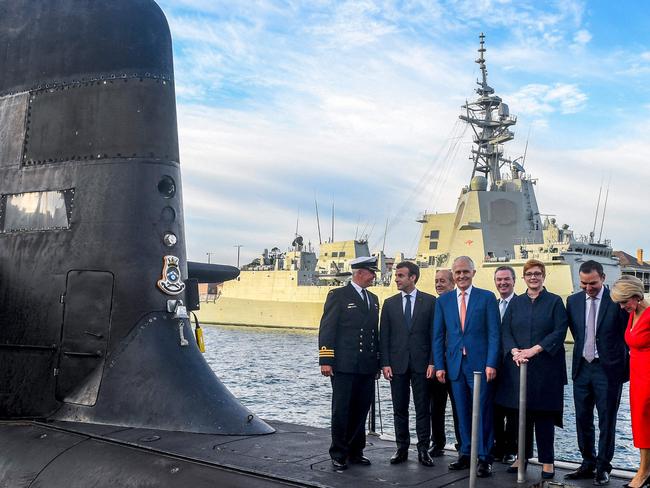
At that time the deal was worth $50 billion but would soon rise to $90 billion to build with another $145 billion to maintain over the life cycle; Australia had to today so far spent $2.4 billion just setting up the infrastructure for them to be built in South Australia.
The French designed 5000-tonne Barracuda (Suffren variant) class submarine for France was nuclear-powered for them, but because of Australia’s ties to nuclear proliferations treaties and conventions, it had to be diesel-electric powered for us.
The dumping of Naval now was a major blow for the group.
“This is a major disappointment for Naval Group, which was offering Australia a regionally superior conventional submarine with exceptional performances,” it said in a statement yesterday
“Naval Group was also offering Australia a sovereign submarine capability making unrivalled commitments in terms of technology transfer, jobs and local content.”
The Federal Government now has given itself 18 months to work out how the deal under the AUKUS pact will work.
More Coverage
Read related topics:AUKUS




